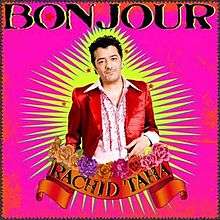Bonjour (album)
Bonjour is the eighth studio album by French–Algerian singer Rachid Taha. It was released by Wrasse Records on 26 October 2009.[1]
Critical response
Bonjour received mixed reviews from music critics. The Guardian reviewer Robin Denselow called the album a "A highly commercial set" that was "not [Taha's] most exciting."[6] David Honigmann of the Financial Times rated the album three out of five stars, but wrote that its emphasis on "technology...stops [Taha] cutting loose."[7]
Songs
"Je T’Aime Mon Amour", Bonjour's opening track, was written about Taha's partner. Its lyrics are a declaration of love for life and his partner.[10] The second track, "Mokhtar", describes the lonely life of a vagrant living in a city.[11] "Ha Baby" was inspired by country music singer Kenny Rogers and Egyptian musician Farid El Atrache.[10] The song, which blends western and Arabic musical styles, is about universal peace and love.[11] The title track, "Bonjour", is a duet with Gaetan Roussel. It was released as the album's lead single and is sung in both French and Arabic.[2] "Mine Jaï", the fifth track, asks a series of questions. In the song, Taha asks the listener where they come from and where they are traveling to.[11]
In the song "Mabrouk Aalik", Taha reflects on the fractured relationship between Jews and Muslims.[10] The seventh track, "Ila Lika", explores life and death.[11] "It's an Arabian Song" is a rock song about the French treatment of Algerians during colonialism. The track features fellow Algerian singer Bruno Maman.[10] "Sélu" is a flamenco song that pays tribute Arab writers and philosophers such as Averroes and Naguib Mahfouz.[10] The album closes with "Agi", a ballad about love.[11]
Track listing
- "Je T’Aime Mon Amour"
- "Mokhtar"
- "Ha Baby"
- "Bonjour" with Gaetan Roussel
- "Mine Jaï"
- "Mabrouk Aalik"
- "Ila Lika"
- "It's an Arabian Song" with Bruno Maman
- "Sélu"
- "Agi"
Charts
| Charts (2009) |
Peak
position |
|---|
| French Albums Chart |
132[12] |
|
Release history
| Region |
Date |
Label |
Format(s) |
Catalog |
|---|
| Europe |
19 October 2009[13] |
Wrasse Records |
Digital download |
Wrass251 |
| 26 October 2009[1] |
CD |
|
Personnel
- Rachid Taha: Composer, Primary Artist
- Sylvain Bernard: Clapping, Keyboards, Organ, Piano, Piano (Electric), Vocals (Background)
- Everett Bradley: Vocals (Background)
- Rodolphe Burger: Guitar (Electric)
- Marc Copely: Guitar (Acoustic), Guitar (Electric), Vocals (Background)
- Hakim Hamadouche: Arranger, Banjo, Guitar (Acoustic), Vocals (Background)
- Steve Hillage: Arranger
- Bruno Maman: Composer, Featured Artist, Guitar (Electric), Interpretation, Synthesizer Bass, Synthesizer Strings, Vocals
- Karim Mansour: Guitar (Electric)
- Morgan Marchand: Clapping, Drum Programming, Keyboards, Percussion Programming, Synthesizer Bass
- Konrad Meissner: Drums
- Daniel Mintseris: Harmonium, Keyboards
- Mark Plati: Bass, Guitar (Acoustic), Guitar (Electric), Keyboards, Loops, Mixing, Producer, Programming, Synthesizer Bass, Vocals (Background)
- Nicki Richards: Vocals (Background)
- Gaëtan Roussel: Composer, Featured Artist, Guitar (Acoustic), Guitar (Electric), Interpretation, Keyboards, Loops, Piano, Producer, Vocals (Background)
- Catherine Russell: Vocals (Background)
- Arthur Simon: Trumpet
- Sóley: Clapping, Guitar (Acoustic), Guitar (Electric), Vocals (Background)
Source: [14]
References
External links
|
|---|
| | Studio albums | |
|---|
| | Compilation albums | |
|---|
| | Live albums | |
|---|
| | Related topics | |
|---|
|
